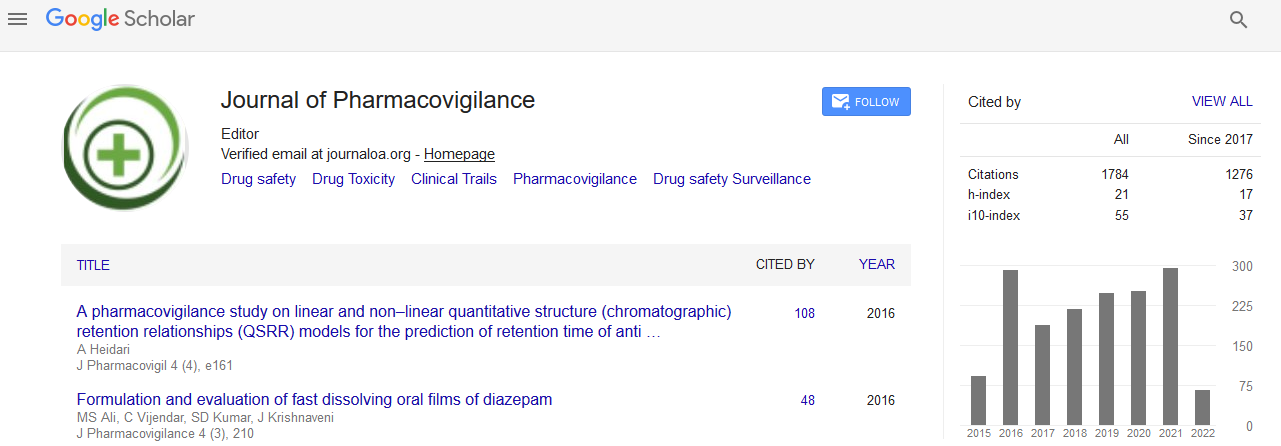Indexed In
- Open J Gate
- JournalTOCs
- The Global Impact Factor (GIF)
- RefSeek
- Hamdard University
- EBSCO A-Z
- OCLC- WorldCat
- Publons
- Euro Pub
- Google Scholar
Useful Links
Share This Page
Journal Flyer

Open Access Journals
- Agri and Aquaculture
- Biochemistry
- Bioinformatics & Systems Biology
- Business & Management
- Chemistry
- Clinical Sciences
- Engineering
- Food & Nutrition
- General Science
- Genetics & Molecular Biology
- Immunology & Microbiology
- Medical Sciences
- Neuroscience & Psychology
- Nursing & Health Care
- Pharmaceutical Sciences
Role of pharmacovigilance in health regulation
3rd International Conference and Exhibition on Pharmacovigilance & Clinical Trials
October 27-29, 2014 Hyderabad International Convention Centre, India
Ayesha Rubina
Scientific Tracks Abstracts: J Pharmacovigilance
Abstract:
Pharmacovigilance is defined as the ?Pharmacological science relating to the detection, assessment, understanding and prevention of adverse effects, particularly long-term and short-term adverse effects of medicines?. It has a primary aim of early detection of unknown adverse reactions and interactions, detection of increases in frequency of (known) adverse reactions, identification of risk factors and estimation of quantitative aspects of benefit/risk analysis and dissemination of information needed to improve drug prescribing and regulation. Post-marketing surveillance of medicines is mainly coordinated by national pharmacovigilance centres in collaboration with the UMC. Indian pharmacovigilance programme was established in India in January 2005 and is seen by the National Pharmacovigilance Advisory Committee based in the CDSCO, New Delhi. 2 zonal centers, 5 regional centers would report to the zonal centers. Each regional center in turn would have several peripheral centers reporting to it, there are 28 peripheral centers. Information is collected from peripheral centers and is sent to regional centers. Regional Centres does the causality analysis and forwards this form to the Zonal Centre. The data is statistically analysed and forwarded to Central Drugs Standard Control Organisation (CDSCO), Ministry of Health & Family Welfare, Govt. of India, New Delhi. Finally the report is deposited in the Global Pharmacovigilance Database managed by WHO Uppsala Monitoring Center, Sweden. The National pharmacovigilance centres have achieved a great deal in collecting and analyzing case reports of ADRs, distinguishing signals, making regulatory decisions based on strengthened signals, alerting prescribers, manufacturers and the public to new risks of adverse reactions.
Biography :
Ayesha Rubina has completed MBBS from JJM Medical College, Davangere. She is currently pursuing her Post graduation (MD) from Rajiv Gandhi University of Health Sciences. She has completed various preclinical and clinical studies like antianxiety and antidepressant property of furosemide and is currently engaged in a clinical study of comparative study of Rupatadine and Cetirizine for safety and efficacy in allergic rhinitis.


